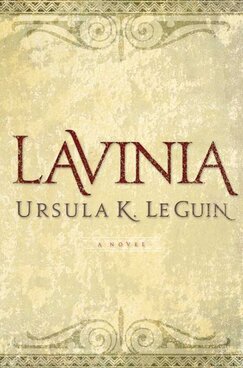
The princess with flaming hair, signifying war; the coveted bride with blushing cheeks, representing bloodshed; the girl who, despite the battles fought over her hand in marriage, never speaks a single line---who really is Lavinia of Virgil's epic The Aeneid? In Le Guin's imagination, she is thoughtful, caring, quiet, fiercely intelligent: a leader in her own right, who loves her people and her freedom, and refuses to be bound to the future others choose for her.
In Lavinia, the titular character traces the story of her life, one ignored or overlooked for centuries. She tells of a happy childhood, the only daughter of King Latinus, wandering the forests and fields of Latium with her best friend; of the sudden arrival of suitors vying for her hand in marriage, and thus the end of her freedom; of the Trojan stranger, foretold of in omens, who arrives on their shore; of the fated war fought with her own future as its prize. And she tells the story that comes after, of her happiness and heartbreak, victories and betrayals, and of her fierce, unyielding determination to protect her people and those she loves.
Lavinia can certainly be enjoyed by those who haven't read The Aeneid---it's a great story, beautifully told, either way---but for those who have, it's simply stunning, a retelling of a classic tale that faithfully follows the threads and characters of the original while deftly smoothing out its inconsistencies, frustrations, and occasional illogicality. I felt as though I was not so much reading a new version of an ancient epic as experiencing Virgil's story through different, perhaps more thoughtful eyes, making it equal parts fascinating and delightful to follow Lavinia's classic tale: or, perhaps more accurately, to discover it. Given the casual misogyny of the original, it's immensely satisfying to read feminist Le Guin's take on The Aeneid, which, while faithful to the original, often approaches its content in a markedly different way. Lavinia is a compelling, independent character who never falls into the trap of some modern historical fiction which grafts modern opinions onto historical characters; even her cruel mother Amata, it is gently suggested, has suffered at the hands of patriarchy perhaps more than Virgil was willing to admit---or able to notice.
Le Guin's mastery of building fantasy worlds is well-suited to evoking the still-rustic land of Latium before it was Rome, a place steeped in ancient tradition and folklore, guided by fate and strange omens as much as political strategy; she leaves the lines between history, ancient invention, and modern interpretation delightfully opaque. The final touch is the introduction of Virgil himself as a character, which, rather than detracting from the main story, enhances it with quiet questions of fate and perspective and who tells enduring tales, and gently reminds readers---and Lavinia herself---of the many layers of existence and opinion needed to tell a tale. Riveting and evocative, I would highly recommend Lavinia to readers ages fourteen and up.



 RSS Feed
RSS Feed
